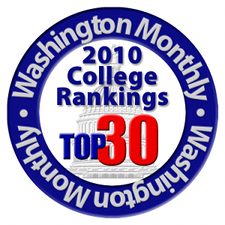University of Scranton Ranks 14th in National List of Service-Oriented Colleges

A “different kind of college ranking” – one that measures how well universities are meeting their public obligations of providing research, service and social mobility –ranks The University of Scranton among the nation’s leading service-oriented colleges. Scranton is ranked 14th in the nation among the top 50 Master’s Universities listed in the September/October issue of Washington Monthly.
The national ranking recognizes universities inclined to “spend energy and resources on encouraging students to give back to their communities and their nation,” according to the article in Washington Monthly that accompanies the listings. “After all, colleges and universities … conduct cutting-edge research that drives economic growth, provide upward mobility to people of humble birth and mold the characters of tomorrow’s leaders.”
“The University of Scranton cherishes its Catholic and Jesuit mission to educate and inspire our students to put their intellect and passion to work for the greater glory of God and the betterment of human kind,” said Rev. Scott R. Pilarz, S.J., president of The University of Scranton. “We are delighted to be among select universities in the nation recognized by Washington Monthly for expressing well our commitment to academic excellence and service – both to our students and to our community.”
The rankings, which became available on Aug. 23, measure a university’s performance in the areas of social mobility, research and service. Washington Monthly weighs each area evenly. The social mobility score is based on the percentage of students receiving Pell Grants and the predicted versus actual graduation rates, based on an analysis reflecting incoming student SAT scores and the percentage of students receiving Pell Grants. The research score evaluates each school’s research expenditure and the number of alumni earning Ph.D.s, relative to the size of the school. The social mobility score is based on the following measures, also adjusted for the size of the school: the size of the ROTC program; number of alumni serving in the Peace Corps; the percentage of federal work study grant money spent on community service projects; the number of students participating in service projects; the number of service hours performed; the number of full-time staff supporting community service; the number of academic courses that incorporate community services and whether or not the university provides scholarships for community service.
At The University of Scranton, more than 2,800 students perform well over 170,000 hours of service each year. Scranton is among just 110 colleges in the nation earning the highly selective Carnegie Foundation for the Advancement of Teaching Community Engagement Classification for both Curricular Engagement (the connection of teaching, learning and scholarship to community) and Outreach and Partnership (the extent of focus of institutional resources on community collaboration). Scranton currently offers 160 for-credit courses with a service-learning component.
In addition, more than 50 percent of the university’s students in sciences, engineering, technology and mathematics already participate in research. Forty-five percent of these students wrote a formal thesis, and 38 percent authored or coauthored a publication and/or conference papers. Also, according to the 2008 NSF Survey on Earned Doctorates, in 2006 (the most recent year reported), Scranton ranked 9th out of 568 master’s institutions that reported data for alumni who earned doctoral degrees in life sciences, and 37th of 568 in the physical sciences.
Similar to U.S. News & World Report rankings, Washington Monthly ranks the colleges and universities based on institution type and degrees offered. The University of Scranton is included in the Master’s University category. Other categories are National Universities, Liberal Arts Colleges, Baccalaureate Colleges and Community Colleges.
The University of Scranton is among 14 Jesuit universities recognized by Washington Monthly and one of just two colleges in northeast Pennsylvania. King’s College in Wilkes-Barre is ranked 30 in the Master’s Universities category.





